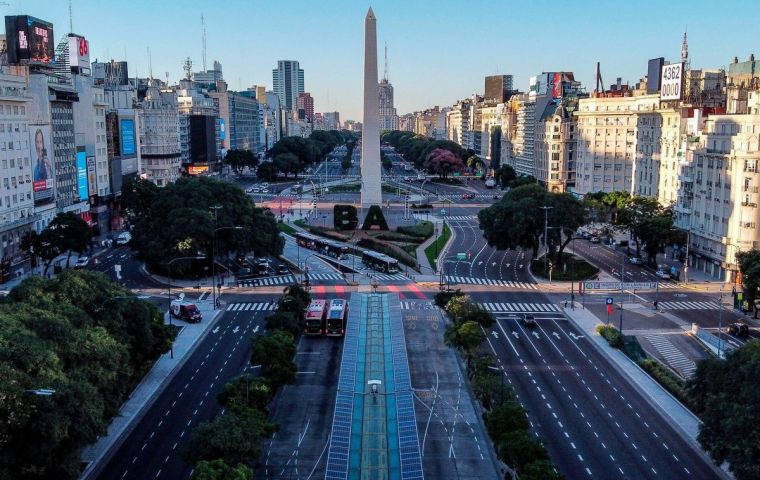MercoPress. South Atlantic News Agency
With the pandemic, Argentina has “a thousand more reasons” to delay debt payments
 The quarantine came after the government had already closed schools, borders and entertainment venues, and suspended most flights into the country
The quarantine came after the government had already closed schools, borders and entertainment venues, and suspended most flights into the country  “I told the IMF that in the next five years we cannot pay them a peso,” Argentine President Alberto Fernández said in an interview
“I told the IMF that in the next five years we cannot pay them a peso,” Argentine President Alberto Fernández said in an interview Argentina does not plan to resume debt payments to the International Monetary Fund (IMF) for five years, buying time to pull the economy out of a worsening recession after the coronavirus outbreak led the government to impose a stay-at-home order until the end of March which also put the brakes- on activity
“I told the IMF that in the next five years we cannot pay them a peso,” Argentine President Alberto Fernández said in an interview on Radio Rivadavia on Sunday. “Before the pandemic, I had told the IMF that we could not pay them at the expense of our people. Now I have a thousand more reasons to say that.”
The spread of the virus, and the respiratory disease COVID-19, was declared a global pandemic on March 11 by the World Health Organization (WHO). It reached Argentina in early March as the country was still struggling to pull out of a recession in its third year and keep from defaulting on more than US$100 billion in debt, including US$44 billion owed to the IMF.
The government has put economic growth behind public health and ordered the country's 44 million people to stay at home. The quarantine, the most drastic in Latin America so far, came after the government had already closed schools, international borders and entertainment venues, and suspended most flights into the country. Now bars, restaurants and most other places where people gather have been shut, leaving only essential services open, including hardware stores, pharmacies and supermarkets. The streets of Buenos Aires, a city with a population of four million, have gone from buzzing with buses, cars and pedestrians to virtually empty, garnering descriptions that it looks like a ghost town.
The downside is that the economy is poised for a deeper contraction than had been expected before. Goldman Sachs said last week that it estimates Argentina's economy will shrink 2.5% this year, worse than a 1.3% contraction that had been forecast by the IMF before the advance of the coronavirus.
“We are going to have to make a major effort to revive the economy,” Fernández said.
Fernández and Economy Minister Martín Guzmán held a videoconference with IMF managing director Kristalina Georgieva last Friday about the impact of the pandemic, and the president said they reached an understanding.
In a statement on Friday and on request from Argentina, Georgieva called on Argentina's private creditors to understand that the country needs “substantial debt relief” so that it can get back on track with its payments. The “substantial debt relief” originally appeared in the IMF technical team visiting Argentina and looking into the country's books and prospects.
Argentina is seeking to restructure US$ 68.8 billion in foreign-currency bonds as quickly as possible, even as soon as the end of this month, Guzmán said on Friday.
The economic impact of the coronavirus means Argentina may not restart payments to the IMF, its biggest creditor, until 2025, two years later than the previous target. Both sides are still in negotiations about a new repayment plan.
The possible delay in debt payments is a sign of the economic impact of trying to contain the virus, which has been rapidly spreading from one confirmed case at the start of March to 266 on March 22, with four deaths, according to government data.
Looking to South Korea
To fight the spread, Fernández is using an approach taken by South Korea, which, along with the WHO, has been advising Argentina. South Korea heeded the WHO's plea to use a combination of social distancing and the testing as many people as possible, helping to slow the spread. The growth in the number of its confirmed cases reported per day peaked on February 28 and has since tapered, according to data from the WHO.
The key to reducing the impact on people's health and the economy is to limit exposure, Fernández said, adding that he is willing to extend the mandatory quarantine if necessary.
It is a strategy that is one of the toughest in the region, even though the number of confirmed cases is higher in Brazil, Chile and Ecuador, according to the WHO.
“We think that the contagion is going to happen, that we are not going to be able to avoid it,” Fernández said in a separate interview on Sunday on television network Telefe. “If we stay at home, the contagion is going to be slower and we are going to be able to deal with it” because there will be enough hospital beds and respirators to handle the cases, he added.
Confinement “is only thing we can do so that the invisible enemy does not infect us massively,” he said. “My pulse will not tremble if we have to extend [the quarantine]. The economy will recover.”




Top Comments
Disclaimer & comment rules-

-

-

Read all commentsIt appears that nothing has changed in the past 170 years...
Mar 25th, 2020 - 03:17 am +2”It seems to. be the ... policy of the Government never to settle or pay any of the many just and meritorious claims against it as long as it is possible to avoid it.' '
Clueless Reeky - The present argie government has repeatedly indicated its intent to default, even if it might use pretty expressions like “unilateral restructuring.”
Mar 25th, 2020 - 12:02 pm +2NB: Before posting more nonsense, Reeky, learn the meaning of default.
Given reeky's inability to grasp the issues, Imoyaro's concise messages may well be appropriate.
Mar 28th, 2020 - 06:05 pm +2Commenting for this story is now closed.
If you have a Facebook account, become a fan and comment on our Facebook Page!